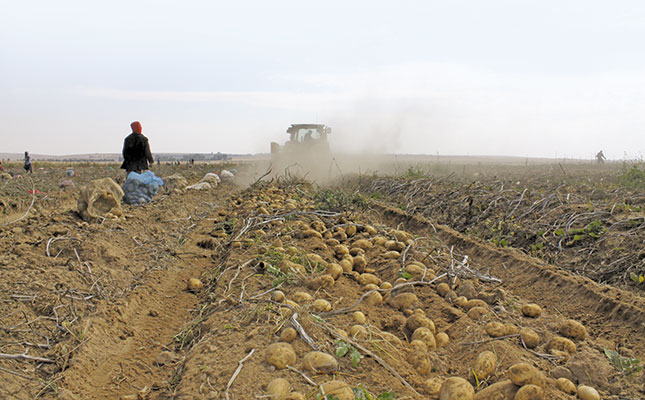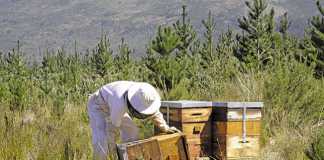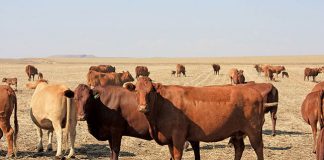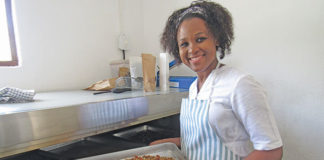
Photo: FW Archive
Establishing new commercial farmers to transform South Africa’s multi-billion rand potato industry is likely to be very costly, it was revealed at a Potatoes South Africa (PSA) transformation symposium held in Stellenbosch recently. Transformation will require highly specialised planting and spraying equipment, and expensive washing machines. On top of this are high packaging and transport costs.
Moreover, anti-dumping protection expired on 20 June. As a result, potato imports are expected to increase substantially, putting local producer prices under pressure.
“We’re romanticising small-scale farming. We must be realistic,” farmer Phophi Raletjena told the symposium.
READ MORE: Protection against potato scab
“It’s probably better for small-scale farmers to produce crops that are easier than potatoes.
“I grew potatoes for two years, but because of the equipment needed, I had to throw in the towel.”
Fortunately for Raletjena, who started farming on 0,5ha of communal land in 2003, there was a twist to this tale. Earlier this year, he landed himself a contract to produce potatoes for McCain on 60ha.
Mentoring
“My mentor, Auwke Jongbloed, must be credited for my small success,” he says. “He’s a commercial farmer in the Blouberg area between Polokwane and Alldays; he’s a white guy who crossed the colour line to help me.” In 2003, Raletjena approached the local tribal chief to obtain some communal land for farming in the area where he grew up. At the time, he was working in Polokwane, and over weekends Jongbloed taught him about cabbage production.
“We did an analysis of the market. At that stage there were 4 500 households in the tribal area and we set ourselves a target to sell at least one cabbage per month to every household,” explains Raletjena. “Eventually Tiger Brands gave us tomato seedlings on credit and so my farming activities expanded.”
Needing a crop for winter production, Raletjena planted potatoes on 20ha in 2010 for the Johannesburg market, but had to quit after the 2011 season. “Because potato prices were high at that stage, Auwke increased his production and had to wash his own potatoes for most of the day. Previously, while prices were low, he had spare capacity and I paid him to wash my potatoes as well.”
Fortunately, Raletjena was making enough money from tomatoes. In fact, three years ago, he managed to rent 1 400ha in Limpopo’s Vivo district, as a result of a land restitution deal. After installing irrigation infrastructure, he was able to produce tomatoes, peppadews and butternuts. The profits he made from these crops enabled him to buy a 72kW high-clearance spraying tractor for R600 000 and a 114kW tractor and a ripper for R1,3 million earlier this year. This was after he had landed the contract to provide unwashed potatoes for McCain.
As the company loads the potatoes from his lands, there are no packaging costs and he has the benefit of price stability. Currently, he employs 10 full-time workers and more than 100 seasonal workers. “Phophi is a remarkable man,” says Jongbloed.
“If all commercial farmers had a better attitude and were more involved with transformation and land reform, we would have been much further.” In 2011, PSA heard that Raletjena was producing potatoes and began assisting him with its Enterprise Development Programme.
Few growers
PSA CEO Dr André Jooste told the symposium that it would set a farmer back between R110 000 to R150 000 to produce just 1ha of potatoes under irrigation, compared with R18 000/ha to R25 000/ ha if he planted maize under irrigation. The figures for dryland production are R60 000/ ha to R90 000/ha for potatoes and R3 000/ ha to R8 000/ha for maize.
These figures, added Jooste, only included variable input costs, such as planting material, fertilisers, chemicals and labour. Packhouse and mechanisation costs and remuneration for the farmer are excluded. The figures also do not take into account money to be reinvested for the following year’s planting. In terms of volumes and value, potatoes are the number one product on South Africa’s fresh produce markets, yet a mere 600 farmers produce this crop commercially on approximately 53 000ha. They therefore make a crucial contribution to food security.
Jooste said the average 2013 yield was 43t/ha, with a total production volume of 225 million bags of 10kg each. The value of the potato industry at primary production level is between R6 billion and R7 billion, while the total value chain is estimated to be between R17 billion and R18 billion. For the sake of food security, PSA would like to see the expertise of South Africa’s commercial potato producers retained, with production expanded by welcoming new entrants to the industry.
Jooste sketched three scenarios for transforming the potato industry through BEE and partnerships (see Table 1).

Crop rotation required that a farm should have at least four times more arable land than its current potato plantings, he explained. Although every new farmer should plant a fairly large area each year, the figures in the scenarios were calculated according to percentages coupled to the transformation goals.
READ MORE: Starting off with potatoes
Jooste went on to point out that many current commercial farmers started out by planting potatoes on as little as 2ha.
“Instead of transforming the industry by establishing the same number of new farmers every year, we’ve adopted a strategy to rather increase the number of hectares that new entrants should plant by rendering them the necessary assistance.” This explains the increase in hectares in the second scenario in Table 1.
PSA identifies new farmers who show potential. A feasibility study, including a business plan, is then drawn up. Thanks to the industry’s statutory levies, which were approved by the National Agricultural Marketing Council (NAMC), PSA is in a position to use at least 20% of these funds for transformation purposes. The statutory levies are spent in line with BEE codes and NAMC guidelines.
In year one, PSA would spend R180 000 on every new farmer by supplying seed potatoes, training, mentoring and providing exposure to the industry. This included the cost of drawing up a business plan. The farmer has to fund the rest of the input costs. In year two, PSA’s contribution is decreased to 75% of the initial amount, followed by 50% and 25% respectively in years three and four.
Give and take
Despite this, added Jooste, PSA was not in a position to foot the entire bill for transforming the industry – hence the necessity for partnerships to be formed with new entrants throughout the entire potato value chain. Several other speakers at the symposium participants iterated this view. It was also pointed out that transformation should lead to sustainable farming and that, apart from trust, partnerships required give and take.
During the symposium, no clarity could be obtained about the role that government’s AgriBEE Fund could play in transformation and how much money was available for such initiatives. Fraud in the past at Land Bank, which managed the fund, has led to an interim suspension of the fund.
“Last year, there was no money available, but this year we do have an allocation,” said Kwena Komape, chief director: co-operatives and rural enterprise development at the Department of Agriculture, Forestry and Fisheries (DAFF). However, Dr Madime Mokoena from DAFF’s BBBEE Directorate pointed out that the AgriBEE Fund was not intended for the poorest of the poor who could not afford to be in business, or for black business millionaires who did not need government grants.
“In terms of AgriBEE’s sector-specific codes, transformation is a journey, but compliance is measured once per year,” said Mokoena.“We’re not forcing people to comply. It’s voluntary. But those who don’t comply, cannot get access to government services. Creating parallel structures is not transformation. We also want to see PSA transforming its board of directors as well as an increased participation of black people in the potato value chain. They must become part of the Tiger Brands of this world and the fresh produce markets.”
According to Mokoena, applicants for the AgriBEE Fund should be legal entities and provide a viable business proposal linked to the strategy of a commodity group. Moreover, they had to make a contribution of 10% for a grant application of less than R5 million and of 20% if they applied for funding of more than R5 million. “Preference will be given to applicant groups consisting mostly of women, the youth, people with disabilities and farm workers,” she added.
Spreading the risk
Alan Winde, Western Cape MEC for Economic Development and Agriculture, said the risk of transformation should be spread to include companies transporting, retailing and shipping potatoes. “We shouldn’t be scared to set ourselves difficult targets which can be measured and reached through innovation,” he stressed.
Phone Dr André Jooste on 012 349 1906/7.
This article was originally published in the 18 July 2014 issue of Farmer’s Weekly.













